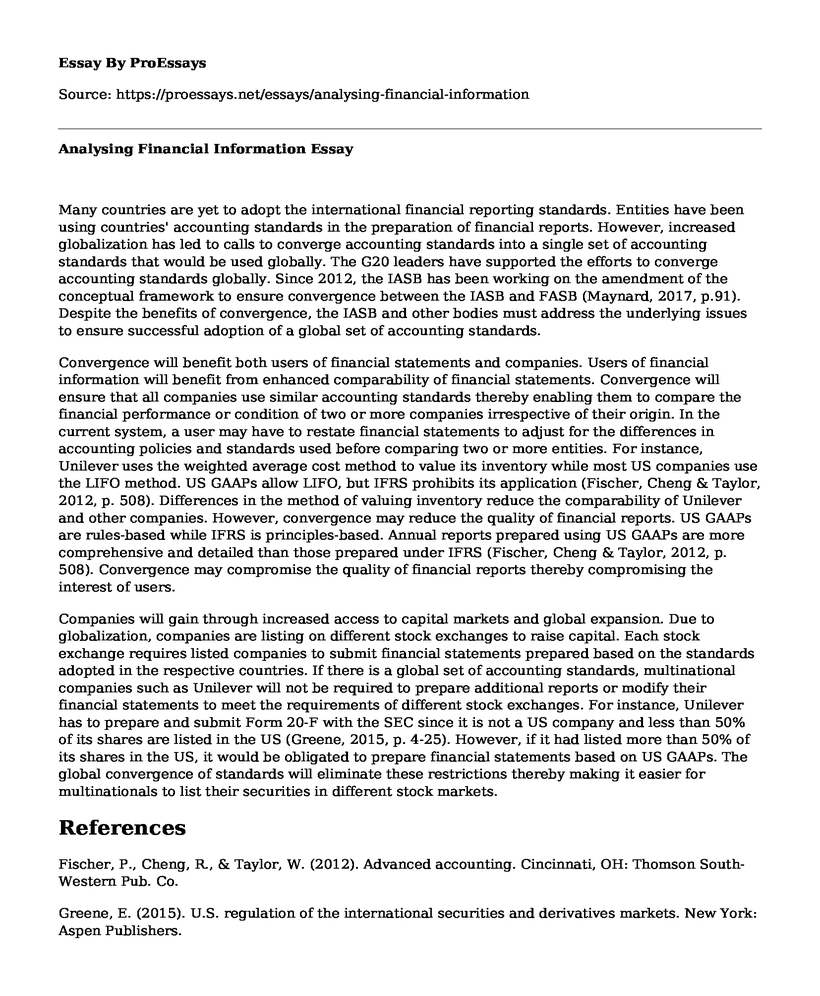Many countries are yet to adopt the international financial reporting standards. Entities have been using countries' accounting standards in the preparation of financial reports. However, increased globalization has led to calls to converge accounting standards into a single set of accounting standards that would be used globally. The G20 leaders have supported the efforts to converge accounting standards globally. Since 2012, the IASB has been working on the amendment of the conceptual framework to ensure convergence between the IASB and FASB (Maynard, 2017, p.91). Despite the benefits of convergence, the IASB and other bodies must address the underlying issues to ensure successful adoption of a global set of accounting standards.
Convergence will benefit both users of financial statements and companies. Users of financial information will benefit from enhanced comparability of financial statements. Convergence will ensure that all companies use similar accounting standards thereby enabling them to compare the financial performance or condition of two or more companies irrespective of their origin. In the current system, a user may have to restate financial statements to adjust for the differences in accounting policies and standards used before comparing two or more entities. For instance, Unilever uses the weighted average cost method to value its inventory while most US companies use the LIFO method. US GAAPs allow LIFO, but IFRS prohibits its application (Fischer, Cheng & Taylor, 2012, p. 508). Differences in the method of valuing inventory reduce the comparability of Unilever and other companies. However, convergence may reduce the quality of financial reports. US GAAPs are rules-based while IFRS is principles-based. Annual reports prepared using US GAAPs are more comprehensive and detailed than those prepared under IFRS (Fischer, Cheng & Taylor, 2012, p. 508). Convergence may compromise the quality of financial reports thereby compromising the interest of users.
Companies will gain through increased access to capital markets and global expansion. Due to globalization, companies are listing on different stock exchanges to raise capital. Each stock exchange requires listed companies to submit financial statements prepared based on the standards adopted in the respective countries. If there is a global set of accounting standards, multinational companies such as Unilever will not be required to prepare additional reports or modify their financial statements to meet the requirements of different stock exchanges. For instance, Unilever has to prepare and submit Form 20-F with the SEC since it is not a US company and less than 50% of its shares are listed in the US (Greene, 2015, p. 4-25). However, if it had listed more than 50% of its shares in the US, it would be obligated to prepare financial statements based on US GAAPs. The global convergence of standards will eliminate these restrictions thereby making it easier for multinationals to list their securities in different stock markets.
References
Fischer, P., Cheng, R., & Taylor, W. (2012). Advanced accounting. Cincinnati, OH: Thomson South-Western Pub. Co.
Greene, E. (2015). U.S. regulation of the international securities and derivatives markets. New York: Aspen Publishers.
Maynard, J. (2017). Financial accounting, reporting & analysis (2nd ed.). Oxford: Oxford University Press.
Cite this page
Analysing Financial Information. (2022, Apr 18). Retrieved from https://proessays.net/essays/analysing-financial-information
If you are the original author of this essay and no longer wish to have it published on the ProEssays website, please click below to request its removal:
- Present Value of Payments Assigment
- Suitable Working Time and Compensation of The Oberoi Hotel Group
- The Effect of International Financial Reporting Standards on Current Tax Planning Strategy
- Research Paper on Blockchain and Bitcoin: Reimagining Electronic Transactions and Economic Systems
- Essay Example on XYZ Ltd: Strategic Analysis of Established Electronics Company
- Essay Example on Funding Decisions in NYC: An Analysis of Census Data
- Developing a Program Evaluation - Essay Sample







